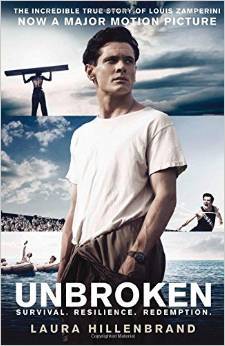 After enduring a near-fatal plane crash, 47 days adrift at sea on a life raft, shark attacks, starvation, enemy fire, and finally being rescued by the Japanese Navy only to be taken as a prisoner of war, you might think nothing worse could happen. But the punches kept coming. Literally.
After enduring a near-fatal plane crash, 47 days adrift at sea on a life raft, shark attacks, starvation, enemy fire, and finally being rescued by the Japanese Navy only to be taken as a prisoner of war, you might think nothing worse could happen. But the punches kept coming. Literally.
So goes the true story of WWII veteran Louis Zamperini, played out in the recent blockbuster film adaptation of Laura Hillenbrand's New York Times bestseller "Unbroken." But make no mistake. Behind this unimaginable hardship is a lesson of forgiveness and the transformative power it represents for us all.
Louis' punches come in the form of Mutsuhiro "Bird" Watanabe, a sadistic Japanese guard at the prisoner of war camp who takes a strong disliking for Louis.
In one scene, strangely reminiscent of a crucifixion, Louis is made to hoist an impossibly heavy beam above his head and remain standing for an indefinite amount of time, or else be shot on the spot if he drops the beam. Instead, he accesses strength his feeble body could never have given him and remains standing, eventually bringing his abuser to his knees.
While adrift at sea, Louis had made a commitment to dedicate his life to serving God if he survived. And that's exactly what he eventually does.
In a letter to Mr. Watanabe in the 1990s he wrote, "As a result of my prisoner of war experience under your unwarranted and unreasonable punishment, my post-war life became a nightmare ... but thanks to a confrontation with God ... I committed my life to Christ. Love replaced the hate I had for you." (The Wall Street Journal, "The Defiant Ones.")
Finding his way to the light and practicing forgiveness became a lifeline for Louis. Christ Jesus' counsel to "love your enemies" was the powerful tool that completely released him from addiction and nightmares triggered by post-traumatic stress following the war.
In a featurette with Louis, who lived to be 97 and just passed away in 2014, the former 1936 Olympian runner counsels, "Don't give up, don't give in ... No matter what happens to you ... 'all things work together for good,'" quoting the Bible passage, "We know that all things work together for good to those who love God, to those who are called according to His purpose." (Romans 8: 28)
While most of us will never endure such extreme circumstances, finding our own way to the light is something we're all called to do. When life's punches come, how do we access the love that heals and redeems?
My study of Christian Science has taught me that this healing love is indeed so powerful that it can only come from a God who is Love itself. As Mary Baker Eddy, the founder of Christian Science, described it, "Divine Love knows no hate; for hate, or the hater, is nothing: God never made it, and He made all that was made. The hater's pleasures are unreal; his sufferings, self-imposed; his existence is a parody, and he ends -- with suicide." (Eddy's Miscellaneous Writings).
Jesus demonstrated the depth of that statement on the cross when he forgave his accusers and eventually proved that his life could not be taken from him. He said, "The thief's purpose is to steal, kill and destroy. My purpose is to give life in all its fullness" (John 10: 10).
Isn't the thief whatever would steal our natural inclination to love and forgive, to live life to its fulness? Yet, we, too, can access this Christ-power and deny the thief entrance, facing down whatever would falsely accuse us or attempt to convince us to feel hatred or revenge. As expressions of Love, qualities such as resilience, patience, kindness, and persistence are natural to our being. These are qualities not cultivated in the fires of hatred or revenge, but by a distinctly divine, shepherding Love.
Louis had hoped his story would help others through film. He waited 50 years for that moment and it finally came, under Angelina Jolie's direction. Omitted from the film, but integral to its message, was the transformation that took place in Louis' post-war life.
In a 1950 visit to Japan, he met with many of his other captors, who recognized him and accepted his forgiveness, although Mr. Watanabe refused to meet with him.
To Louis' primary life message I would add, "Don't give up on loving, don't give in to hating." That simple message, followed, will do much to heal our world.
